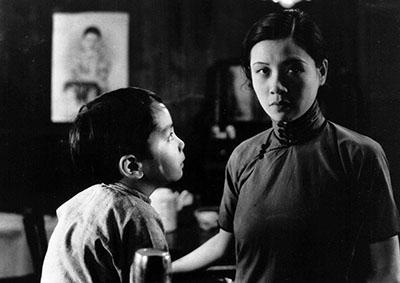Directed by Wu Yonggang
Silent screen legend Ruan Lingyu, giving a fierce and tragic performance in her signature role as a wronged prostitute, is the electric center of The Goddess, one of the most powerful silent films of all time and an early high point for Chinese cinema. Ruan plays a nameless young "goddess" (1930s slang for her actual profession) who walks the streets in order to provide for her son. A run-in with a petty gangster results in the hoodlum becoming her pimp against her will; after he does nothing to help when her son is expelled from school, and ultimately steals the tuition money she had set aside, she exacts a terrifying vengeance. Key Second Generation director Wu Yonggang brings both an unsparing eye and a gentle humanism to this exceptional film, never flinching from the realities and consequences of the heroine's work but never judging her for resorting to what was (and is) a relatively normal profession. But Ruan's luminous performance and presence is the true crux of the film: scholars Chris Berry and Mary Farquhar consider her character in The Goddess, "a remarkable condensation in one figure of different aspects of the times," including Confucian family devotion, gender, national identity, the new complexities of capitalism, and Ruan's own scandalous off-screen image (as brilliantly depicted in Stanley Kwan's 1992 Ruan biopic Center Stage).
Lianhua Film Company. Screenwriter: Wu Yonggang. Cinematographer: Hong Weilie. Cast: Ruan Lingyu, Zhang Zhizhi, Li Keng, Li Junxin, Tang Huaiqiu.
35mm, b/w, silent with English intertitles, 85 min.
Note: Live musical accompaniment by Cliff Retallick.






 Mobile Navigation
Mobile Navigation

